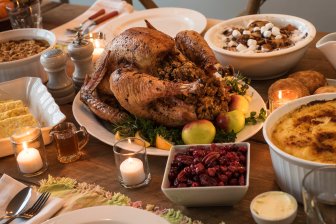Over the next few days, staff at H&S Meats will endure some of their busiest days of the year and get a feel for how the Christmas season will unfold.
“(Thanksgiving) gives us a good indication of what Christmas is going to look like, and yeah, it’s nice and busy. It’s always nice to see people hustling and bustling,” owner Scott Scichilone said at their Quispamsis, N.B., location Thursday.
But don’t be shocked if buying groceries for Thanksgiving dinner costs substantially more this year.
Read more:
Cooking for Thanksgiving? These items will cost more as inflation bites
Read More
-
Cooking for Thanksgiving? These items will cost more as inflation bites
The industry has felt the burden of higher fuel costs, increased prices for livestock feed and other factors forcing operators to hike prices.
Despite this, Scichilone said there remains substantial demand for the holiday bird, but with a minor change compared to previous years.
“What people were buying pre-COVID is a little bit different than what they’re buying now, especially with turkeys. You’re seeing a lot more smaller-size turkeys being ordered versus the larger 20-pounders.”
Scichilone expected somewhere between 300 and 500 turkeys to be delivered from a local farm on Thursday afternoon.

Across the country consumers have been impacted by higher grocery costs destined to create sticker shock over the holidays.
According to the latest monthly inflation report released by Statistics Canada in September, costs for food purchased in stores were up 10.8 per cent compared to the same period last year.
For Ken Mclaughlin of Saint John, sitting down to eat Thanksgiving dinner with his family of eight will mean buying smaller portions than usual.
“The cost of everything has increased substantially,” he said outside a grocery store, adding shelves appear to carry less locally grown products.
Changes to typical buying habits have become more popular due to rising levels of inflation.
Read more:
Hurricanes Ian, Fiona could drive up grocery costs on these items in Canada
According to Halifax-based Narrative Research, Canadians have made on average 1.7 changes to their purchasing behavior in recent months.
A September survey found nearly half of the respondents are going without items or buying less, and buying local when possible. Nearly a third have begun to buy in bulk just in case things run out.

While consumers have become more cautious of their spending, Scichilone said he still expects a few last-minute purchasers to stumble into his shop this weekend.
As a result, he said, he’s ordered additional turkeys for those who forgot to plan ahead.
© 2022 Global News, a division of Corus Entertainment Inc.




